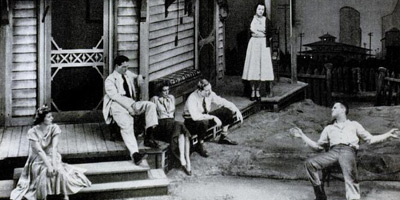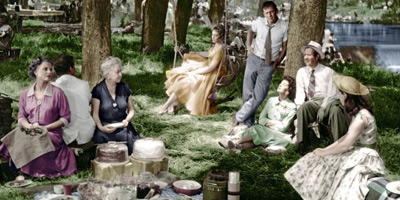Summer Lovin': How the Pulitzer Prize-Winning Picnic Turned Up the Heat on Broadway 60 Years Ago
A dashing drifter, a beautiful girl and the last day of summer… sounds romantic, no? Passion and propriety collide in William Inge’s Picnic, the 1953 dramedy that’s receiving a starry Broadway revival at the American Airlines Theatre. How did this steamy tale fare when it debuted, and how has it continued to thrill audiences for 60 years? Get a quick history lesson on Picnic’s impressive past!

Inge by Inge
William Inge grew up in Independence, Kansas, in a boarding house run by his mother, a set-up very much like the one depicted in Picnic. After stints as a teacher and drama critic, Inge was encouraged by Tennessee Williams to try playwriting; his second script, Come Back, Little Sheba, became a Broadway hit in 1950. Three years later, Inge penned Picnic, a small-town tale of gender relations and sexual frustration, featuring a multigenerational company whose lives are changed when a handsome vagabond appears just before the Labor Day picnic.
“It’s funny, charming, human, tragic and subtle, all in a beautiful mix,” said legendary actress Ellen Burstyn, who stars in the current Broadway revival as Helen Potts, who is charmed by the drifter Hal Carter as a distraction from caring for her elderly mother. In a chat with Broadway.com, Burstyn noted, “It’s really about the relationships of people and what goes on between men and women—and, at that time, how important it was for a woman to get married.”
The original Broadway production of Picnic opened at the Music Box Theatre on February 19, 1953, directed by Joshua Logan and starring Janice Rule as leading lady Madge Owens and Ralph Meeker as the mysterious Hal, as well as Kim Stanley, Eileen Heckart and Paul Newman (in his Broadway debut as Madge's rich suitor Alan Seymour). The three-act play won two Tony Awards—for Logan's direction and the now-defunct Best Stage Technician—though Inge was not nominated for his soon-to-be classic.

Red-Hot Reaction
Critics deemed Picnic an improvement over Come Back, Little Sheba, with a Life magazine reviewer calling it “the raw material of poetry” and “a bigger hit than any nonmusical show on Broadway.” The New York Times wrote, “Having one good play to his credit, William Inge now has another.”
“People who have seen the show when it first was on Broadway remember that it was a very big deal. Audiences used to walk out,” says Sebastian Stan, who plays Hal in the current revival. Picnic indeed caused a stir in the arts community because of its sexual frankness and challenging of the gender status quo.
Despite controversy, Picnic earned Inge the Pulitzer Prize for Drama (and a then-whopping $500 prize) in 1953. The play continued to run on Broadway until April 10, 1954, after which Inge penned two more Broadway shows—Bus Stop and The Dark at the Top of the Stairs—both of which earned positive reviews. By the early '60s, Inge had earned the nickname “Playwright of the Midwest.”

From Kansas to Hollywood
After Picnic’s Broadway success, Paramount and 20th Century Fox expressed interest in adapting Inge’s play for the big screen, but both studios were concerned over the story’s straightforward approach to sex. Columbia Pictures won the bidding war, and production began in May 1955, with Daniel Taradash penning the screenplay and Joshua Logan returning as director. Arthur O’Connell, who played salesman Howard Bevans, was the only actor from the Broadway play to reprise his role onscreen.
Hunky movie star William Holden and gorgeous blonde newcomer Kim Novak were cast as tangled lovers Madge and Hal, oozing chemistry even as the Production Code Administration urged the studio to eliminate any suggestion of sexual relations between the two leads.
Released in theaters on February 17, 1956, Picnic earned six Academy Award nominations (including Best Picture and Director), winning two (for Art Direction and Editing). The movie remains Number 59 on AFI’s list of the 100 greatest love stories of all time.

Musical, Sequel, Revival, TV!
Given the success of the play and movie, it's no surprise that a musical version of Picnic was proposed by Joshua Logan, who oversaw an adaptation called Hot September with a score by Kenneth Jacobson and Rhoda Roberts. The show ran in Boston in 1965, losing $400,000 after three weeks. (A planned New York opening was cancelled). However, Hot September was preserved with a cast album which included songs like “Another Crummy Day,” “This Town/A Guy Like Me” and “Golden Moment” (covered by Frank Sinatra).
After winning an Oscar for his screenplay of Spendor in the Grass, Inge's career went downhill, and he committed suicide in 1973 at age 60. Two years later, producers mounted a Broadway staging of Summer Brave, his self-described re-working of Picnic, which he began a few years after the film’s release. “I admit that I prefer it to the version of the play that was produced,” Inge wrote in his notes. Summer Brave never found success, closing after just 18 performances.
Despite being regarded as a mid-century American classic, Picnic did not receive its first Broadway revival until 1994, when Roundabout Theatre Company brought the comedy back with film star Ashley Judd and TV actor Kyle Chandler as Madge and Hal, as well as Larry Bryggman, Tate Donovan, Anne Pitoniak and Debra Monk. The production, called “a Picnic to treasure” by the Daily News, received three Tony nominations in the featured acting categories.
Picnic also appeared on television in a Showtime special in 1986 starring Gregory Harrison and Jennifer Jason Leigh, and again in 2000 on CBS with Josh Brolin and Gretchen Mol.

Laying Out the Blanket
On January 13, 2013, Roundabout’s second revival of Picnic opened at the American Airlines Theatre, starring Maggie Grace, Sebastian Stan and theater veterans Ellen Burstyn, Elizabeth Marvel, Reed Birney and Mare Winningham.
“I think it’s always a good time to reconnect with great American stories,” director Sam Gold told Broadway.com. Added Grace, “It’s a classic American piece, but it’s one that we’re able to approach with certain things that 2012 does gift us with. We can be a little more free with it.” Both Ben Rappaport (as suitor Alan) and Madeleine Martin (as Madge's sassy sister Millie) noted the play's "Chekhovian" feel.
The revival serves as a showcase for some of Broadway’s most impressive talents, but more than that, the new Picnic is an appetite-whetting reminder of the power of American storytelling, resonating just as strongly now as it did 60 years ago.



